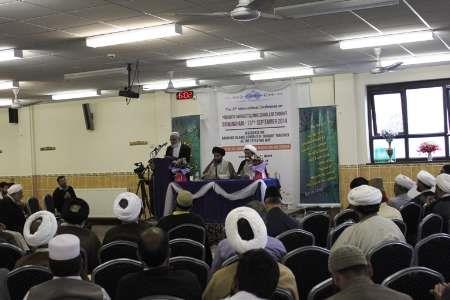Shia, Sunni Scholars Call for Unity, Confronting Extremism

The Islamic Center of England and the Majlis-e Amal UK jointly organized the event.
Titled "Bringing Islamic schools of thought together is the effective way to battle a media calling for agitation and sedition", it brought together a group of prominent Shia and Sunni clerics and scholars.
The participants underlined the need for unity among Muslims and their vigilance against extremist and Takfiri groups.
In an address to the conference, head of the Majlis-e Amal UK Mufti Muhammad Faruq Alawi described Muslims, Shias and Sunnis, as a united Ummah and urged all Muslims to keep away from extremism and discord, IRNA reported.
He also urged the Islamic Ummah to act in union against the enemies of Islam including the Zionist regime.
Hojat-ol-Islam, Mohammad Ali Shomali, the head of the Islamic Center of England, was another speaker at the conference.
He said one of the problems in the world is that some people have failed to recognize the beauties of religion and spirituality.
Hojat-ol-Islam Shomali further criticized extremism as well as some media that seek to foment discord among Muslims.
Several other SHia and Sunni scholars and thinkers from countries like Pakistan, Iran, Bahrain, Iraq and Lebanon also addressed the forum.
The international conference was held amid recent attempts by Western media to falsely portray the crises fueled by Takfiri terrorists in Syria and Iraq as Sunni-Shia conflicts.
However, senior Shia and Sunni leaders have repeatedly stressed that what is taking place in Syria and Iraq is not sectarian strife as the Takfiri criminals have threatened all communities and religious groups during their terror operations in both neighboring states.
Terrorists from the ISIL Takfiri group are controlling large swathes of land in Iraq and Syria. The extremist militants have even claimed the formation of a so-called Islamic caliphate or state in northern Iraq.



